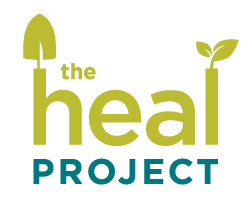Winter Vegetables Come in All Colors
By Summer Williams
At The HEAL Project students learn how important it is to eat a wide variety of colorful produce – they learn to “eat the rainbow.” Focusing on a wide range of colors will increase your intake of various nutrients and benefit your health.
The eye-catching colors of the fruits and vegetables we eat are important to our diet. Colors come from phytochemicals in plants that work together with vitamins, minerals, and fiber for numerous health benefits. The most vibrantly colored fruits and vegetables are the richest in vitamins, minerals, fiber, and antioxidants.
Red
Red fruits and vegetables such as raspberries, radishes, red bell peppers, red onions, and cranberries are packed with vitamins C & A, potassium, and antioxidants. They are high in lycopene, which can lower your risk of cancer as well as heart and lung disease.
Yellow & Orange
Yellow and orange fruits and vegetables abound during the fall and winter months— apples, bananas, carrots, persimmons, winter squash, pineapple, sweet potatoes, yellow peppers, tangerines, mango, and pumpkin.
The yellow and orange colors in produce are created by carotenoids and contain vitamin C, vitamin A, and potassium— nutrients that help reduce the risk of heart disease, cancer and vision problems, and boost the immune system. Beta-carotene is a carotenoid that your body uses to produce vitamin A, so it’s important to have in your diet.
White & Brown
The health benefits from white vegetables come from anthoxanthins, with its antioxidant properties. Other white foods like garlic contain allicin, which can help lower the risk of high blood pressure, high cholesterol, cancer, and heart disease. Many white fruits and vegetables are very good sources of potassium, vitamin C, folate, niacin, and riboflavin. Mushrooms, onions, cauliflower, garlic, leeks, parsnips, and daikon radishes are some of the white and brown vegetables that can be found in the fall and winter months. They are delicious and nutritious.
==
Summer Williams holds a Bachelor of Science in nutrition and dietetics from San Francisco State University. A certified personal trainer and certified health coach, Summer is an intern at The HEAL Project this year.


